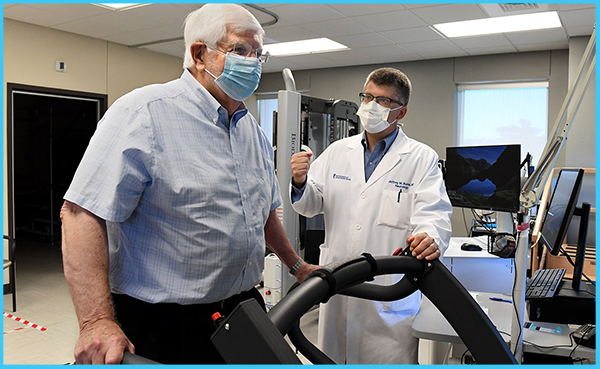
Want to maximize your brain health as you age? Exercise may be your best investment.
Researchers at the University of Kansas Medical Center are engaged in various research on exercise. The common conclusion? Exercise is wonderful for our bodies but especially helpful for our brains.
A study in JAMA Neurology last year showed that walking 9,800 steps per day was associated with steady declines in dementia risk and even fewer steps than the 9,800 threshold were still associated with a decline. The study also found that greater walking intensity was related to significantly lower dementia risk, and for people who reached 3,800 steps per day, dementia onset was reduced by 25%.
None of this surprised Russell Swerdlow, MD, co-director of the KU Alzheimer’s Disease Research Center (KU ADRC) and professor of neurology at KU School of Medicine.
“If exercise were a pill, we’d all be clamoring for a prescription,” he said. “We don’t fully understand exactly how exercise works, but we understand enough that everyone should be doing it.”
Swerdlow notes that there are exercise studies at the KU ADRC looking to see what “dose” of exercise is optimal for the prevention of cognitive decline, and he points out that the study in JAMA Neurology is one that associates steps with health, not one that tests different amounts of exercise in a randomized trial.
“This is certainly an area ripe for further study, and so many people at KU Medical Center are looking at exercise and preventing or slowing a number of diseases.”
John P. Thyfault, PhD, professor in the departments of cell biology & physiology and internal medicine in the KU School of Medicine and Director of the KU Diabetes Institute, points out that exercise is directly linked to changes in numerous organs, including our brains.
“Exercise is involved with neurogenesis, the making of new neurons,” Thyfault said, noting that it also appears to increase mitochondria and increase glucose metabolism. That’s important, Thyfault said, because we know that a decline in glucose utilization precedes cognitive decline. “We also know that the benefits of exercise go all across the disease spectrum,” he said.
Sandra Billinger, PhD, professor of neurology at the KU School of Medicine, studies exercise, brain health, and stroke recovery. She said that there are proven benefits to pumping blood through your system with exercise.